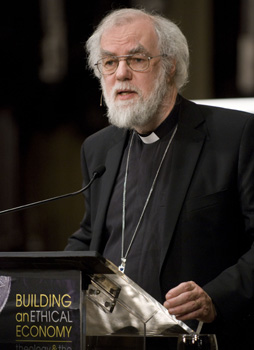Archbishop: An Ethical Economy Models 'Good Housekeeping'

An ethical economy is built on the principles of "good housekeeping," the Archbishop of Canterbury Dr. Rowan Williams said during a lecture at Trinity Wall Street Church in New York City.
Speaking at the opening presentation of a three-day conference titled "Building an Ethical Economy: Theology and the Marketplace," Williams used the metaphor of a "household" to explain the values present in a healthy economy, and conversely, those absent in a destructive one.
"A working household is an environment in which vulnerable people are nurtured and allowed to grow up (children) or wind down (the elderly); it is a background against which active people can go out to labour in various ways to reinforce the security of the household; it is a setting where leisure and creativity can find room in the general business of intensifying and strengthening the relationships that are involved," he said.
"Good housekeeping seeks common well-being so that all these things can happen; and we should note that the one thing required in a background of well-being is stability… a theory that wanders too far from these basics is a recipe for damage to the vulnerable, to the regularity and usefulness of labour and to the possibilities human beings have for renewing (and challenging) themselves through leisure and creativity," he added.
Noting the recent global financial crisis as an instance of "instability," Williams referred to the economic downturn as a result of "the effects of trying to structure economic life…independently of intelligent choice about long-term goals for human beings," with those goals, as explained by theology, being "mutuality" and a common good.
"The Christian Scriptures describe the union of those who are identified with Jesus Christ as having an organic quality, a common identity shaped by the fact that each depends on all others for their life."
"The model of human existence that is taken for granted is one in which each person is both needy and needed, both dependent on others and endowed with gifts for others. And while this is not on the whole presented as a general social programme, it is manifestly what the biblical writers see as the optimal shape of human life, life in which the purposes of God are made plain."
"Helpless alone and gifted in relationship: this is where we start in addressing the world of economics from a Christian standpoint."
Williams went on to say that a "theological stress" on economics must be coupled with an examination of what is "assumed and what is being actively promoted by our economic practices about human motivation, about character and integrity."
"If we find, as a good many commentators and researchers have observed in recent years, that working practices regularly reward behaviour that is undermining of family life, driven or obsessional, relentlessly competitive and adversarial, we have some questions to ask."
"As well as working for a global economic order that is just and mutual, we need habits in the actual workings of the financial 'industry' that do not destroy…'discerning self-awareness' and the capacity for humane relationships."
Following his remarks, Williams was joined by a discussion panel of theologians and economists including Susan Lee, an economist and commentator for National Public Radio; Kathryn Tanner, a theology professor at the University of Chicago Divinity School; and Sir Partha Dasgupta, an economics professor at the University of Cambridge.
Tanner and Dasgupta, who are also be presenting at the conference, will join Williams again for discussion during the event's closure on Friday.
